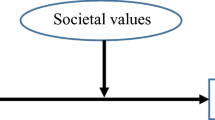Abstract
Using the 2012 China Household Finance Survey, this study finds that happiness in China is positively associated with expenditures on status-related and socially motivated goods, not with spending on improving material well-being or primarily intended for procuring material goods. It also reveals that socially motivated consumption has a status element and the effects of different types of consumption on happiness vary with people’s educational background.
Similar content being viewed by others
Notes
In the regression, income and consumption are logged while wealth is in hundreds of thousands of 2011 Chinese yuan. Striving for the maximum number of observations, I use log (reported value + 1) to account for zero income and consumption.
Income, consumption, and happiness are flows while wealth is a stock and changes slowly. Thus, the endogeneity of wealth is arguably less concerning.
In an attempt to validate this interpretation, I also add provincial crime rates to the model and it does not change my conclusion. However, other interpretations of this question are possible.
However, I cannot rule out other interpretations like self-selection. For example, it could be that people who care more about material comfort are more likely to pursue a higher education.
References
Blanchflower DG, Oswald AJ (2004) Well-being over time in Britain and the USA. J Pub Econ 88:1359–1386
Clark AE, Frijters P, Shields M (2008) Relative income, happiness, and utility: an explanation for the Easterlin paradox and other puzzles. J Econ Lit 46:95–144
Cryder CE, Lerner JS, Gross JJ, Dahl RE (2008) Misery is not miserly: sad and self-focused individuals spend more. Psychol Sci 19:525–530
Cui Z, Feng Y (2017) Wealthy hand-to-mouth households in China. Asian Econ J 31:275–297
DeLeire T, Kalil A (2010) Does consumption buy happiness? Evidence from the United States. Int Rev Econ 57:163–176
Ferrer-i-Carbonell A (2005) Income and well-being: an empirical analysis of the comparison income effect. J Pub Econ 89:997–1019
Frank R (1985) The demand for unobservable and other nonpositional goods. Am Econ Rev 75:101–116
Graham C, Eggers A, Sukhtankar S (2004) Does happiness pay? An exploration based on panel data from Russia. J Econ Behav Organ 55:319–342
Guven C (2012) Reversing the question: does happiness affect consumption and savings behavior? J Econ Psychol 33:701–717
Heffetz O (2011) A test of conspicuous consumption: visibility and income elasticities. Rev Econ Stat 93:1101–1117
Hofstede G (1984) Culture’s consequences: International differences in work-related values. Sage, Beverly Hills
Howell R, Hill G (2009) The mediators of experiential purchases: determining the impact of psychological needs satisfaction and social comparison. J Posit Psychol 4:511–522
Mohanty MS (2009) Effects of positive attitude on happiness and wage: evidence from the US Data. J Econ Psychol 30:884–897
Okulicz-Kozaryn A, Nash T, Tursi NO (2015) Luxury car owners are not happier than frugal car owners. Int Rev Econ 62:121–141
Oshio T, Nozaki K, Kobayashi M (2011) Relative income and happiness in Asia: evidence from nationwide surveys in China, Japan, and Korea. Soc Ind Res 104:351–367
Oswald AJ, Proto E, Sgroi D (2015) Happiness and productivity. J Labor Econ 33:789–822
Powdthavee N (2010) How much does money really matter? Estimating the causal effects of income on happiness. Empir Econ 39:77–92
Stevenson HW (1991) The development of prosocial behavior in large-scale collective societies: China & Japan. In: Hinde RA, Groebel J (eds) Cooperation and prosocial behaviour. University Press, Cambridge
Winkelmann L, Winkelmann R (1998) Why are the unemployed so unhappy? Evidence from panel data. Economica 65:1–15
Xu A, Xia Y (2014) The changes in mainland Chinese families during the social transition: a critical analysis. J Comp Stud 45:31–53
Zimmermann, S. (2014). The pursuit of subjective well-being through specific consumption choice. https://papers.ssrn.com/sol3/papers.cfm?abstract_id=2484660. Accessed Mar 19 2018
Acknowledgements
This study was funded by the California State University, Los Angeles (2017–2018 Minigrant). The author thanks Valentina Diba for research assistance.
Author information
Authors and Affiliations
Corresponding author
Ethics declarations
Conflict of interest
The author declares that she has no conflict of interest.
Rights and permissions
About this article
Cite this article
Cui, Z. Happiness and consumption: evidence from China. Int Rev Econ 65, 403–419 (2018). https://doi.org/10.1007/s12232-018-0303-1
Received:
Accepted:
Published:
Issue Date:
DOI: https://doi.org/10.1007/s12232-018-0303-1




